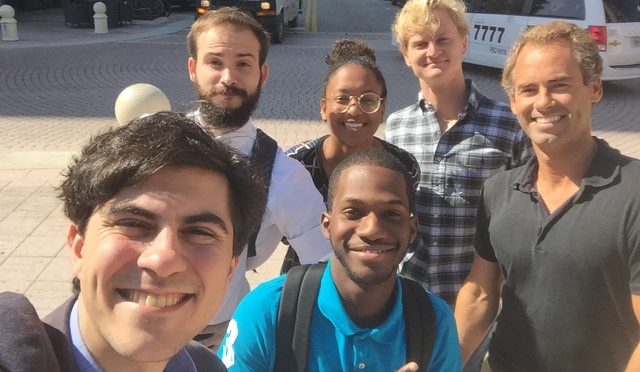By Daniel Lofaso
Read Time 6 MinutesFormer Hitachi Executive Nick Howe Talks about his involvement in new startup Area 9 and how it compares to that of the corporate world.
Nick Howe had a somewhat strange career arc. He is an engineer by training and by inclination – he graduated with a degree in Chemical Engineering in the UK then went to work for Bechtel Corporation in the petrochemical industry designing process equipment in refineries and oil platforms.
At university Howe had been interested in programming and had an affinity for it. Personal computers and CAD/CAM were making big inroads into engineering in the mid-eighties, and he naturally gravitated into it. Throughout the 90’s Howe did pretty much every job in IT – high- and low-level programming, system and network management, application support and eventually moved in IT services with EDS, the global IT outsourcer.
He ran a pre-sales team for EDS, which led into professional services and consulting with Hitachi, a Fortune Global 500 corporation ranked 37th. Howe built and ran the European professional services business for a few years, and at that point his career took its next major turn. He inherited the customer education business, and found he enjoyed that part more than anything else.
From there Howe was lucky enough to be offered a global role leading employee development, and also the customer and partner training business – which he did for 11 years, right up until the summer of 2016.
Here’s a Q & A with Nick to get a sense of the contrasts between corporate life and that of startup life.
Daniel Lofaso: How did you get involved in Area9 and can you provide some background on what you and your team are trying to achieve?
Nick Howe: After working for three global companies, the smallest of which had 45,000 employees, In the last few months I decided it was time for a change. I now lead corporate strategy for Area9 Learning, a small Danish software company with less than 200 employees.
In my learning role at Hitachi I’d see how inefficient and ineffective most corporate education is. Despite all the advances from the industrial revolution to the internet, education has hardly changed since Socrates, Plato and Aristotle. Three years ago I discovered Area9, and quickly became their customer. I was incredibly impressed by them and their products, and when I retired from Hitachi, Area9 offered me a role with them. With Area9 Learning, we are bringing the power of neuroscience and computer science to revolutionize the way that employees learn.
Please expand on this a bit more, and the adaptive learning approach Area9 takes.
Every employee is different – different experiences, interests, schooling, attitudes – yet when it comes to training, companies treat everyone as though they are the same. If you want to learn, say, project management, you get pushed through the exact same courses, no matter how much you already know. This is frustrating for the learner and can cost thousands of dollars in lost productivity.
Area9 Learning’s platform enables true personalization of a company’s training content – what is known as ‘adaptive learning’. It adjusts in real-time to your knowledge, skills, and experience and teaches only what you need. This dramatically reduces the time it takes to reach mastery, puts the power in the hands of the learner and saves the company money.
Today we focus on a number of industries: Hospitality (hotels, food, beverage), Transportation, Energy, Retail & Consumer Goods, Industrials, and Automotive but also have clients in Healthcare, Technology and Sport.
You can find out more at www.Area9Learning.com
Hitachi is one of Area 9’s clients. It is not uncommon for startups to be created due to a need seen by an employee of a much larger corporation (but not met by that corporation). Can you speak to your experience and provide advice for any potential business owners who are thinking about exploring this path of entrepreneurship (creating a product or service that is complimentary to the corporation they currently work for/worked for)?
The nature of large corporations is that there are always competing demands for resources, and all kinds of filters on what can and can’t be done. Something that is just incredibly difficult to get done at a large company can be trivial for a startup that can focus on it 100%.
But – having the idea isn’t the challenge. Execution and scale is the challenge. Turning an idea into reality is difficult enough, but the thing that is really difficult in my experience is growing the customer base. It is tempting to get excited by the first two or three customers, but scaling that up can be incredibly difficult. We saw that launching new products at Hitachi; it isn’t just a startup problem.
And if you are in a company today, and you can see a glaring problem that you know you can solve doesn’t mean that the company will be bothered to fix it. You have to be in the right place at the right time, with the right connections – and have luck on your side.
In regards to Hitachi vs startup life at Area9:
What parallels can you draw from the corporate world and startup world?
People and mission. Ultimately all business, whether it is a 10-person startup or a $100b global corporation, is about people – how you treat your customers, your colleagues, your employees, and your suppliers defines your company.
And if you combine that with a clear mission, the business won’t exactly take care of itself, but you will have a framework that simplifies decision making and leads to the right outcomes.
What are the major difference’s you can draw from the corporate world and startup world?
The most obvious one I’ve seen is a sense of urgency – virtually all startups have it, very few large corporations do. It sounds a little stupid to say that distance creates separation, but what I mean is that distance from the customer – created because of different functions, or geographies, or layers of management – often creates a sense of detachment and a lack of focus on what matters.
How are processes different or similar at companies of these sizes?
It is tempting to say that big companies have them, and small companies don’t. It may be more accurate to say that big companies NEED them. Trying to get anything done at scale is at best inefficient and at worst impossible in a large company without great processes.
What challenges does a startup face that you were not used to at the corporate level?
It may be counterintuitive, but sometimes scale can give you flexibility. When it comes to spending, dollar amounts that can be a rounding error on a corporate P&L can be life and death to a startup. In the corporate world, the scale allows us to take risks that would be virtually impossible to most startups.
How does accountability differ at a startup level versus that of a corporation?
If you lead the business correctly, there shouldn’t be any difference. People have an intrinsic desire to be accountable for their own actions, and to be given the opportunity to perform. I’ve always found as a leader that people will live up to your expectations. There is a temptation in large corporations for politics and bureaucracy to dominate, but transparency and delegation lead to accountability, not a loss of control.
If you give people a sense of direction, the opportunities and the means to be successful, and ask them to be accountable for their actions, motivation naturally follows.
There are a lot of former executives in the South Florida area:
What are some reasons – beyond the obvious tax breaks and great weather – that you think you guys are moving to this area and getting involved in startups?
The weather! Did I mention the weather? It has always surprised me that more companies aren’t based down here in Florida. Florida has some of the best universities in the US, a great influx of talent from Latin America, and did I mention the weather?
If Magic Leap can attract half a billion dollars of investment to the area, what’s to stop other companies?
What does this mean for talent or resources?
Hopefully, it won’t get as crazy as Silicon Valley – but it will mean that local talent won’t have to head to California, Boston, New York or Chicago for the best jobs.
What do you forecast for South Florida’s resource pool in the coming years?
That kind of depends on what how the universities respond. Hopefully we’ll see lots of great opportunities for kids growing up here, but also an influx of talent from the rest of the country.
Just for fun: You love Tesla and have even published a book, Owning Model S that is quite popular within Tesla itself. What motivated you to research and write this?
I love technology, and performance cars. Tesla’s Model S is the perfect combination. I was one of the first owners, and a group of us were learning as we went along because information from Tesla was so scarce. That learning and research became my book, which I wrote primarily to help other people who were new to the world of electric cars. It is great to get in on the front end of something that is going to be truly world-changing.














